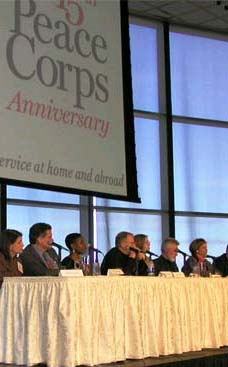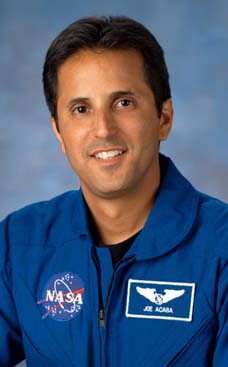2006.04.05: April 5, 2006: Headlines: Development: Freedom of Speech: Freedom of the Press: Journalism: Speaking Out: World Bank: International Herald Tribune: David Hoffman says World Bank should link loans to developing world to press freedom
Peace Corps Online:
Peace Corps News:
Peace Corps Library:
Development:
January 23, 2005: Index: PCOL Exclusive: Development :
2006.04.05: April 5, 2006: Headlines: Development: Freedom of Speech: Freedom of the Press: Journalism: Speaking Out: World Bank: International Herald Tribune: David Hoffman says World Bank should link loans to developing world to press freedom
David Hoffman says World Bank should link loans to developing world to press freedom

If Wolfowitz and the Bank are to attack corruption effectively, they would also be well advised to make media freedom a precondition for future loans. The adoption of a media accountability index with common standards, to measure a country's compliance with basic media freedoms, would greatly reduce corruption in the developing world. The bank has been reluctant in the past to speak out on this issue for fear that it would be seen as interfering in the domestic politics of sovereign states. But media freedom is a universal right; it is also a precondition for tackling the central issue of corruption. As Wolfowitz has said, "you really can't talk about economic development without talking about freedom of the press."
David Hoffman says World Bank should link loans to developing world to press freedom
World Bank should link loans to press freedom
David Hoffman International Herald Tribune
WEDNESDAY, APRIL 5, 2006
Caption: Demonstrators call for freedom of the Press in Kathmandu.
ARCATA, California At 1 a.m. on a recent morning in Nairobi, masked police officers broke into the offices of KTN television and The Standard, a Kenyan newspaper, both owned by the Standard Media Group. Commandos with assault rifles seized files and equipment. The printing press was shut down, newspapers were burned, employees terrorized and three reporters were jailed.
While the Kenyan president and several ministers pleaded ignorance of the assault, John Michuki, the internal security minister, admitted that the press raids were planned by government officials, who presumably wanted to send a signal to the Kenyan media that recent reporting on government corruption would not be tolerated. "When you rattle a snake you must be ready to be bitten," he said.
Such a blatant crackdown on the media had not been seen in Kenya for 20 years. While 26 embassies and international organizations protested, including the United Nations, the World Bank, as is its custom, kept silent.
Then, after hesitating for six days, the bank openly rebuked the government for the raid, and The Standard reported that the bank had imposed a new rule making press freedom a condition before the World Bank would agree to release $250 million in frozen loans. The loans had been withheld since reports surfaced of massive government fraud, even before John Githongo, appointed by President Mwai Kibaki to be Kenya's "anticorruption czar," exposed details of government graft and fled the country.
Colin Bruce, the World Bank's country director in Kenya, denied that the bank was making freedom of the media a new element of conditionality, but by then the Kenyan stock market had already tumbled.
Even if formal conditionality has not been imposed, the World Bank's president, Paul Wolfowitz, is quietly breaking precedent by ordering the bank to publicly protest when press freedoms are under attack.
Wolfowitz understands that open news media are the most important means to expose the endemic corruption that is undermining economic growth in the developing world. And he is determined to do more than just talk about it. He recently held up $800 million in loans, including the quarter of a billion dollars for Kenya, because of allegations of corruption. "Corruption is the biggest threat to democracy since Communism," Wolfowitz has said.
Wolfowitz and senior World Bank economists know that strong, independent news media play a key role in promoting transparency and good governance, which in turn lead to economic and political development. Corruption can only flourish when governments operate with impunity outside the bright lights and public exposure that independent media bring. So autocrats and corrupt politicians everywhere seek to suppress their homegrown independent media.
The bank has been reluctant in the past to speak out on this issue for fear that it would be seen as interfering in the domestic politics of sovereign states. But media freedom is a universal right; it is also a precondition for tackling the central issue of corruption. As Wolfowitz has said, "you really can't talk about economic development without talking about freedom of the press."
If Wolfowitz and the Bank are to attack corruption effectively, they would also be well advised to make media freedom a precondition for future loans. The adoption of a media accountability index with common standards, to measure a country's compliance with basic media freedoms, would greatly reduce corruption in the developing world.
Inducements to increase transparency within government can only go so far. Unleashing a free press makes the public an active participant in reform. Protected by the threat of World Bank sanctions, the media everywhere would play their natural role of watchdog of the public interest.
In his book, "America at the Crossroads," Francis Fukuyama concludes that domestic pressure is the most effective force for long-term institutional reform. A free press guarantees that the public is informed and has a voice. By making press freedom a condition for its loans, the World Bank would protect the media, allowing them to defend the public's right to transparency and accountable government.
The bank is moving in the right direction. Media conditionality would be a decisive step forward.
David Hoffman is President of Internews Network, an international non-profit organization that promotes access to information for people around the world.
Copyright © 2006 the International Herald Tribune All rights reserved IHT
When this story was posted in March 2006, this was on the front page of PCOL:





Peace Corps Online The Independent News Forum serving Returned Peace Corps Volunteers
 | History of the Peace Corps
PCOL is proud to announce that Phase One of the "History of the Peace Corps" is now available online. This installment includes over 5,000 pages of primary source documents from the archives of the Peace Corps including every issue of "Peace Corps News," "Peace Corps Times," "Peace Corps Volunteer," "Action Update," and every annual report of the Peace Corps to Congress since 1961. "Ask Not" is an ongoing project. Read how you can help. |
 | The Peace Corps Library
The Peace Corps Library is now available online with over 40,000 index entries in 500 categories. Looking for a Returned Volunteer? Check our RPCV Directory. New: Sign up to receive PCOL Magazine, our free Monthly Magazine by email. Like to keep up with Peace Corps news as it happens? Sign up to recieve a daily summary of Peace Corps stories from around the world. |
 | Peace Corps suspends program in Bangladesh
Peace Corps Director Gaddi H. Vasquez announced the suspension of the Peace Corps program in Bangladesh on March 15. The safety and security of volunteers is the number one priority of the Peace Corps. Therefore, all Peace Corps volunteers serving in Bangladesh have safely left the country. More than 280 Peace Corps volunteers have served in Bangladesh since the program opened in November 1998. Latest: What other newspapers say. |
 | Invitee re-assigned after inflammatory remarks
The Peace Corps has pulled the invitation to Derek Volkart to join the Morocco Training Program and offered him a position in the Pacific instead after officials read an article in which he stated that his decision to join the Peace Corps was in "response to our current fascist government." RPCV Lew Nash says that "If Derek Volkart spoke his mind as freely in Morocco about the Moroccan monarchy it could cause major problems for himself and other Peace Corps volunteers." Latest: Volkart reverses stance, takes new assignment in Paraguay. |
 | March 1, 1961: Keeping Kennedy's Promise
On March 1, 1961, President John F. Kennedy issues Executive Order #10924, establishing the Peace Corps as a new agency: "Life in the Peace Corps will not be easy. There will be no salary and allowances will be at a level sufficient only to maintain health and meet basic needs. Men and women will be expected to work and live alongside the nationals of the country in which they are stationed--doing the same work, eating the same food, talking the same language. But if the life will not be easy, it will be rich and satisfying. For every young American who participates in the Peace Corps--who works in a foreign land--will know that he or she is sharing in the great common task of bringing to man that decent way of life which is the foundation of freedom and a condition of peace. " |
 | Paid Vacations in the Third World?
Retired diplomat Peter Rice has written a letter to the Wall Street Journal stating that Peace Corps "is really just a U.S. government program for paid vacations in the Third World." Director Vasquez has responded that "the small stipend volunteers receive during their two years of service is more than returned in the understanding fostered in communities throughout the world and here at home." What do RPCVs think? |
 | RPCV admits to abuse while in Peace Corps
Timothy Ronald Obert has pleaded guilty to sexually abusing a minor in Costa Rica while serving there as a Peace Corps volunteer. "The Peace Corps has a zero tolerance policy for misconduct that violates the law or standards of conduct established by the Peace Corps," said Peace Corps Director Gaddi H. Vasquez. Could inadequate screening have been partly to blame? Mr. Obert's resume, which he had submitted to the Peace Corps in support of his application to become a Peace Corps Volunteer, showed that he had repeatedly sought and obtained positions working with underprivileged children. Read what RPCVs have to say about this case. |
 | Why blurring the lines puts PCVs in danger
When the National Call to Service legislation was amended to include Peace Corps in December of 2002, this country had not yet invaded Iraq and was not in prolonged military engagement in the Middle East, as it is now. Read the story of how one volunteer spent three years in captivity from 1976 to 1980 as the hostage of a insurrection group in Colombia in Joanne Marie Roll's op-ed on why this legislation may put soldier/PCVs in the same kind of danger. Latest: Read the ongoing dialog on the subject. |
 | Friends of the Peace Corps 170,000 strong
170,000 is a very special number for the RPCV community - it's the number of Volunteers who have served in the Peace Corps since 1961. It's also a number that is very special to us because March is the first month since our founding in January, 2001 that our readership has exceeded 170,000. And while we know that not everyone who comes to this site is an RPCV, they are all "Friends of the Peace Corps." Thanks everybody for making PCOL your source of news for the Returned Volunteer community. |
Read the stories and leave your comments.

Some postings on Peace Corps Online are provided to the individual members of this group without permission of the copyright owner for the non-profit purposes of criticism, comment, education, scholarship, and research under the "Fair Use" provisions of U.S. Government copyright laws and they may not be distributed further without permission of the copyright owner. Peace Corps Online does not vouch for the accuracy of the content of the postings, which is the sole responsibility of the copyright holder.
Story Source: International Herald Tribune
This story has been posted in the following forums: : Headlines; Development; Freedom of Speech; Freedom of the Press; Journalism; Speaking Out; World Bank
PCOL32369
02


















